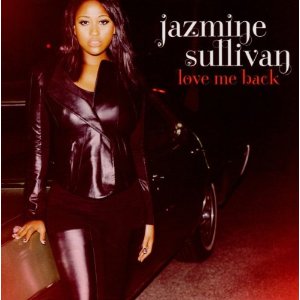Her debut album, 2008’s Fearless, garnered Philly soulstress Jazmine Sullivan a plethora of critical plaudits – among them a clutch of Grammy nominations. The praise mostly focused on her admittedly special voice, a husky alto of breathtaking power. That’s both emotional and physical power: it is a battering ram of feeling, a bull in a china shop, and it provides the passionate heft that’s the linchpin of her material, the weightiness that allows comparisons to greats such as Mary J Blige to stand up, ensuring that she’s never less than convincing. But the praise for her vocal cords drowned out the fact that Fearless also showed Sullivan to be a remarkably ambitious artist, particularly regarding her stylistic restlessness: the album traversed reggae, Stargate pop balladry, tango, waltz and Daft Punk samples as well as classic R&B. Not for her the kind of crossover hype that has accompanied supposed "genre-smashers" such as Janelle Monáe, though – a measure of just how far babbling about sci-fi can get you compared to dissecting the minutiae of love and relationships in a creative, emotionally honest way.
Never mind: on Sullivan’s follow-up, Love Me Back, her ambition has not been diminished – quite the reverse. It’s a thoroughly exhilarating listen – and concise, too, clocking in at just 40 minutes, with only two songs exceeding the four-minute mark. Sullivan gets in, makes her point with panache and gets out – and she doesn’t need to bust out of her genre to prove her creativity. Opener and lead single ‘Holding You Down (Goin’ In Circles)’ demonstrates this from the outset. Not for it a lazy sample exhumed for a ready-made, recognisable hook: instead, its constantly chopping and changing snippets transforms old-skool breakbeats into a startling-sounding patchwork tapestry of memories. It’s as though Sullivan is flicking obsessively through radio stations, trying to find the perfect fit for her mood, as caught up in that as in the cycle of co-dependence that she laments in the song.
‘Holding You Down’ is something of a red herring: Love Me Back mostly finds Sullivan in buoyant mood, wrestling far fewer demons than on Fearless. Sure, her slow realisation that she’s being taken for a fool on the aching ‘Good Enough’ stings – but once she shows that fool the door, she’s ready to let her hair down. ‘Don’t Make Me Wait’ is a coquettish and utterly irresistible disco number that finds Sullivan, improbably, on the dancefloor making eyes at boys and crooning, "I’ll get my Vanity 6 on." She’s barely recognisable, singing with actual restraint in a higher register, like a woman who’s had a full makeover post-breakup and can’t wait to show it off. ‘Love You Long Time’ finds her back in love, but this time elated: one of the most inventive arrangements on the album, sassy fingerclicks give way to a military tattoo and the most exultant, carolling backing vocals. The album finishes with Sullivan flipping its pleading title on its head: ‘Luv Back’ is a celebratory reggae kiss-off, complete with airhorns and ‘Hold Yuh’-style piano plinking, that sounds like a great lost Lady Saw song.
In her sheer joy, Sullivan also flips her entire selling point around. The rawness of her roar seemed tailor-made for tear-jerking confessionalism: it’s the kind of voice that’s associated with heartbreak and loss. On Love Me Back, she turns its overwhelming strength of feeling into the perfect vehicle for joyous liberation. Indeed, the album’s weakest moments come when, as on ’10 Seconds’, she delves back into deepest, darkest Sullivania-by-numbers. ‘Holding Me Down’ apart, Sullivan’s best representations of more painful emotions come when she flexes her songwriting muscles more theatrically: the alliance of spoken-word narratives of crack whores and domestic abusers to a massive gospel chorus on ‘Redemption’, the ringing-all-too-true wit of battle of the exes ‘U Get On My Nerves’, on which Sullivan and Ne-Yo snipe pettily and cattily at each other. (Why Ne-Yo was unable to write anything half as precise on his own disappointing Libra Scale album is a mystery.)
R&B artists tend to receive most critical praise when they ostentatiously bust out of their genre – when they make a point of removing themselves from its formalism. Sullivan, though, proves how much more mileage there is in letting your ideas run riot while staying true to genre values – and has made the most creative R&B album of the year to prove it.


